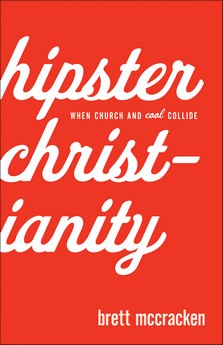 Brett McCracken’s Hipster Christianity attempts to document the fusion of modern western Christianity with the hipster subculture. It’s mostly a descriptive book with a bit of prescriptive advice at the end that might ruffle some feathers, but for the most part McCracken -– a writer for spiritual hipster publication Relevant magazine –- offers germane insight into the recent movement.
Brett McCracken’s Hipster Christianity attempts to document the fusion of modern western Christianity with the hipster subculture. It’s mostly a descriptive book with a bit of prescriptive advice at the end that might ruffle some feathers, but for the most part McCracken -– a writer for spiritual hipster publication Relevant magazine –- offers germane insight into the recent movement.
McCracken, a self-described hipster, helpfully offers a general, secularized history of the notion of “hip” and places its origins as far back as the Enlightenment, with Rousseau’s On the Social Contract (though he committed a slight academic flub by referring to the medieval period as the Dark Ages). He leads us through the dandies to the beatniks and all the way up to the present day purveyors of cool: the hipster, and its Christianized versions and their particular brand of theology. The real takeaway meat of McCracken’s book raises issues with the merging of Christianity and the hipster movement and attempts to resolve the question as to whether Christianity can be “cool” at all.
As I’ve mentioned before, McCracken’s book is mostly an objective analysis of the hipster social phenomenon. One of the more interesting chapters is the third, where the various sub-hipster factions are examined, and it got me doing an examination of conscience at my degree to which I was a hipster (McCracken even has an unscientific survey on his site to determine your level of hipsterdom), though I had a good idea of the answer already. I’m about 50-50 hipster: yay to secular art and literature, tattoos, and deferential discussions of theology with non-Christians; I get docked points for living in the suburbs, giving thumbs up to capitalism (not corporatism), and having Explosions In the Sky as my sole hipster-approved music on my iPod. Fifty percent is usually a failing grade.
Though he is more or less sympathetic to the hipster movement in his book, McCracken wisely defers to his “Christian” side. I think he may regard hipster Christianity as just another trend-swell within the church and treats its ideals as secondary to the stalwart presence of the church on earth. He even admits to the trend’s recent decline, and here would have been an opportunity to posit some predictions at the next movement to pass. One would assume something gap-filling and swinging in a Chestertonian counter-direction. Just as hipster’s bar-hopping tendencies and penchant for vintage-style ecumenism was a reaction to evangelicals’ teetotalist tut-tutting and megachurchery, so will the next movement tip the balance in certain respects away from hipster Christianity.
So can Christianity be “cool”? I don’t think McCracken doesn’t give a definite answer, but it’s really a trick question. Christianity’s – or the various movements within Christendom’s attempts to be genuinely relevant to secular culture –- is an irrelevant variable. God’s truths aren’t subject to social trends or the shifting demands of the market. The last few chapters has McCracken giving scripture-based advice to the Christian hipster movement on the aspects of the hipster culture that are at odds, or could be at odds, with the truths of Christianity. It’s run-of-the-mill advice to those familiar with orthodox Christianity, but that’s actually good: the propositional truths of Christian doctrine have not and should not change, though their emphases do change given cultural standards (one is reminded of the tailored admonishments and warnings Jesus gave the churches in Revelation). There is nothing new in McCracken’s reminders. It would be suspect if there were.
This is a disclaimer to any meddling government bureaucrats reading this and wondering if I got this book for free. I did, so now you can feel better that you are getting paid to keep innocent people safe from another blogger’s book review.